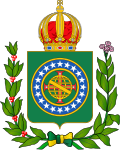Brazilian nobility
Brazilian nobility refers to the titled nobles and fidalgo families of Brazil, which began in the early 19th century during Colonial Brazil and lasted until the end of the Empire of Brazil in 1889.
History
Brazilian nobility originated from the Portuguese nobility, during the time of colonial Brazil.
The noble titles were a sign of political power among the elite. Some of the nobles were members of Portuguese noble lineages and even of the high nobility, especially the families that arrived during the first centuries of the colonization of Bahia, Sergipe, Pernambuco, Rio de Janeiro and São Paulo.
The elevation of Brazil to the status of kingdom, under the United Kingdom of Portugal, Brazil and the Algarves, in 1815, led to the creation of the first Brazilian noble titles. With the Independence of Brazil from Portugal in 1822, the Empire of Brazil established its own nobility. It was constituted of the titles of Duke, Marquis, Count, Viscount and Baron; and by honorific orders, decorations, and medals. Unlike most systems of nobility, the Brazilian nobility was not hereditary: a title died with its holder.
Between 1831 and 1840, there were nominations to titles and honors, on account of the Regency Law, a constitutional correction approved during the Trine Provisional Regency.
During the reign of Pedro II, the advent of the commercialization of coffee, it was the great coffee-growers who started to collect such titles, being acquaintances of the coffee barons. According to Affonso de Taunay, around 300 holders had their income linked to coffee: farmers, bankers and traders.
| Brazilian Nobility in 1869 | |
|---|---|
| Title | Number |
| Duke | 1 |
| Marquis | 11 |
| Count | 11 |
| Viscount | 36 |
| Baron | 180 |
| Total | 239 |
With the proclamation of the Brazilian republic, in 1889, the Brazilian nobility was extinguished. It was also prohibited, under penalty of accusation of high treason and the suspension of political rights, to accept noble titles and foreign decorations without the proper permission of the State. Particularly, the nobles of greater distinction, by respect and tradition, were allowed to use their titles during the republican regime; a well-known example is the Baron of Rio Branco.
Famous nobles
- Auguste de Beauharnais, Prince Consort of Portugal, Duke of Santa Cruz
- Domitila de Castro do Canto e Melo, the Marchioness of Santos
- Thomas Cochrane, 10th Earl of Dundonald, the 1st Marquess of Maranhão
- José Maria da Silva Paranhos Júnior, the Baron of Rio Branco
- Luís Alves de Lima e Silva, Duke of Caxias
- Manuel Luís Osório, Marquis of Erval
- Manuel Marques de Sousa, Count of Porto Alegre
- Honório Hermeto Carneiro Leão, Marquis of Paraná
- Honório Hermeto Carneiro Leão Filho, Henrique Hermeto (later Baron of Paraná)
- Irineu Evangelista de Sousa, Viscount of Mauá
- José Paranhos, Viscount of Rio Branco
- Joaquim José Inácio, Viscount of Inhaúma
References
- Schwarcz, Lilia Moritz. As barbas do Imperador: D. Pedro II, um monarca nos trópicos. 2. Ed. São Paulo: Companhia das Letras, 1998. Template:Pt icon
External links


